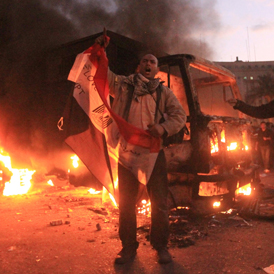Egypt’s cabinet offers its resignation
The Army Council is said to be considering the Egyptian cabinet’s offer of resignation, as reports suggest Egyptian troops have used live ammunition against protesters.
The crowd at Tahrir Square grew to tens of thousands on Monday evening, as local news reports suggest that Egypt’s civilian cabinet has offered its resignation to the military council.
Security forces have apparently used live ammunition and reportedly attacked a makeshift field hospital with tear gas on Monday in the Egyptian capital ahead of the first parliamentary elections in decades, due to take place on 28 November.
Officials from Cairo’s main morgue said 33 people have died since Saturday, whilst the health ministry put the number of injured people at 1,750 over three days.
Monday’s clashes in Cairo reportedly took place near the Interior Ministry near Tahrir Square as protests took place in other major cities in Egypt, including Alexandria and Suez.
The violence near Cairo’s official buildings came after a deal was struck late on Sunday between the authorities and Imam Mazhir Shahin – who led Friday’s prayers at Tahrir Square – to allow protesters to remain in the centre of the square as long as they did not move to government buildings around the perimeter.
‘Live ammunition fired’
Human Rights Watch’s Heba Morayef told Channel 4 News from Cairo that some 10,000 people were protesting in the main square on Monday, although violence had been mainly being confined to Tahrir Square’s side streets around the Interior Ministry.
“The field-hospital is on a side street, it has been tear-gassed a number of times since yesterday, but it’s difficult to say if it’s intentional as the military have been firing indiscriminately,” she said.
She went on to say that doctors have told her of live ammunition being used to shoot protesters in the head and chest.
Read more: February's battle for Tahrir Square
Deadly crackdown
On Friday tens of thousands of people peacefully returned to Tahrir Square in the largest and most explicit display of opposition to the Supreme Council of the Armed Forces (Scaf) since it took power from Hosni Mubarak on 11 February.
The protest in Tahrir square turned violent on Saturday as the military fired tear gas and rubber bullets at demonstrators gathered in the central square, although the military deny using live bullets.

The crackdown continued into Sunday, with state television claiming 12 people had been killed after security forces attempted to clear Tahrir Square.
Presidential candidates Mohamed ElBaradei and Abdallah al-Ashaal denounced violence against protesters and called for a national salvation government, state news agency Mena said.
The European Union‘s foreign policy chief, Catherine Ashton, echoed their calls, urging Egypt’s interim authority to halt the violence.
“I urge calm and restraint and condemn the use of violence in the strongest terms,” she said.
Meanwhile, Emad Abu Ghazi, Egypt’s culture minister, resigned in protest over the violence.
Read more: After Gaddafi, where next for the Arab Spring?
‘A tyranny replacing a tyrant’
With one week to go before parliamentary elections, many of the demonstrators chanted slogans displaying alarm at recent efforts by Field Marshal Mohamed Hussein Tantawi’s military junta to impose a constitution that would protect the military from civilian oversight.
Activists also say the military has continued to rely on emergency laws and summary justice dispensed by military courts and has targeted media and opposition figures critical of its authority.
They are demanding that presidential elections, currently scheduled for late 2012 or early 2013, be held earlier to ensure a faster transition of executive power from the military.
Dr Hossam Abdalla, a member of the National Association for Change opposition group, told Channel 4 News he expected “more violence” as the military cling on to power.
“The people toppled a tyrant only to be given a new tyranny, the army have always wanted to hold on to power,
“But the people didn’t just want an end to Mubarak’s rule, they wanted an end to the regime. I expect there to be more violence perhaps, but I expect the elections to go ahead.
“The key point, however, is this: What comes next, what deals will those who win the seats make with the military?”
The army has denied any desire to cling onto power and says it will not let any violence delay the parliamentary poll. It insists it can ensure security during the vote.
“We are all insisting on having the election on time – the government, parties and the Supreme Council of the Armed Forces,” Mohamed Hegazy, a cabinet spokesman, told reporters.
Read more: Coptic violence in Cairo investigated
